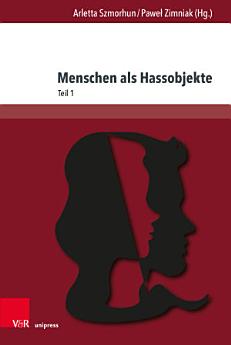Menschen als Hassobjekte: Interdisziplinäre Verhandlungen eines destruktiven Phänomens, Teil 1
Jul 2022 · V&R Unipress
Ebook
284
Pages
family_home
Eligible
info
reportRatings and reviews aren’t verified Learn More
About this ebook
›Hassspiele‹ werden nicht nur in Zeiten von Kriegen und Revolutionen getrieben. Sie stellen auch in Friedenszeiten einen Normal- und zugleich Grenzfall menschlicher Kommunikation dar, der affektive Dynamiken des gesellschaftlichen Miteinanders sichtbar werden lässt. Am Beispiel literatur-, kultur- und sprachwissenschaftlicher Analysen wird einerseits gezeigt, wie durch Hassbesessenheit ganze Existenzen, Individuen und Kollektive, ihre Kulturen, Werte, Beziehungen und Heimatorte inter- und intrakulturell beschädigt und vernichtet werden (können). Andererseits werden Akzente gesetzt, die verdeutlichen, dass der Bildung von Hasskollektiven affektive Gruppenbildungen gegenüberstehen, die sich gegen den Hass wenden, sodass der hassgesteuerten Kommunikation und Interaktion auch eine produktive Solidarisierungskomponente abzugewinnen ist. Hate-based 'grudge matches' are not only played during periods of wars and revolutions. Even in peacetime, they represent a normal but at the same time a borderline case of human communication, which reveals the affective dynamics of social interaction. If one thinks of the human emotional balance, hatred is considered as a type of devastating 'mental reality' that releases destructive energies and creates relational-performative worlds that flout all compassion and human decency. On the one hand, by means of literary, cultural and linguistic analyses, it is shown how the entire existence of an individual or a group and, as a result, their cultures, values, relationships and hometowns are (or can be) damaged and destroyed on intercultural and intracultural basis through obsession with hatred. On the other hand, when dealing with the hate phenomenon, important points of emphasis are placed in order to clarify that the formation of hate collectives faces at the same time the formation of affective groups that turn against this phenomenon.
About the author
Dr. Arletta Szmorhun ist Literaturprofessorin am Institut für Germanistik der Universität Zielona Góra, Polen. Ihr Forschungsschwerpunkt ist die neueste deutschsprachige Literatur im Kontext aktueller Diskurse von Macht und Gewalt, Körper und Sexualität sowie Fremdheit und Andersheit.
Rate this ebook
Tell us what you think.
Reading information
Smartphones and tablets
Install the Google Play Books app for Android and iPad/iPhone. It syncs automatically with your account and allows you to read online or offline wherever you are.
Laptops and computers
You can listen to audiobooks purchased on Google Play using your computer's web browser.
eReaders and other devices
To read on e-ink devices like Kobo eReaders, you'll need to download a file and transfer it to your device. Follow the detailed Help Center instructions to transfer the files to supported eReaders.






